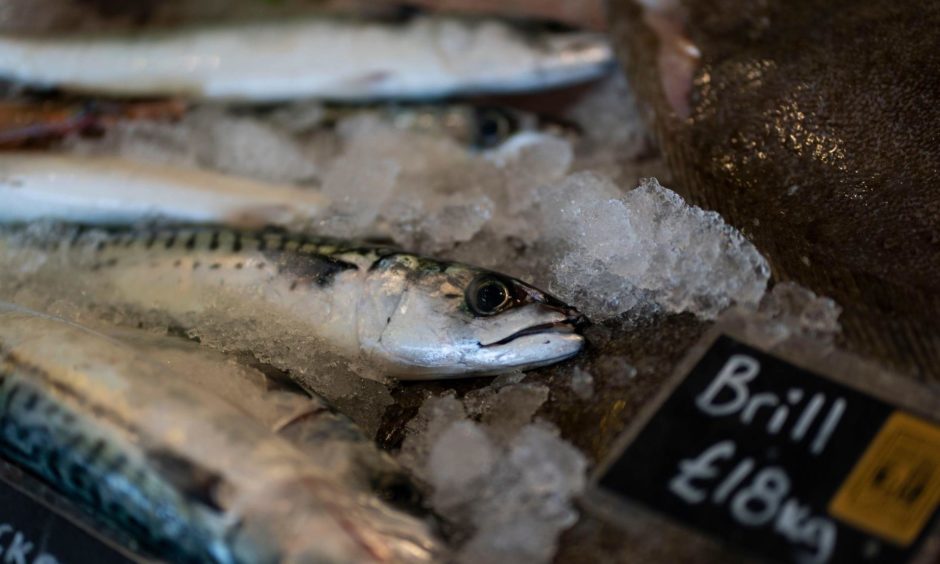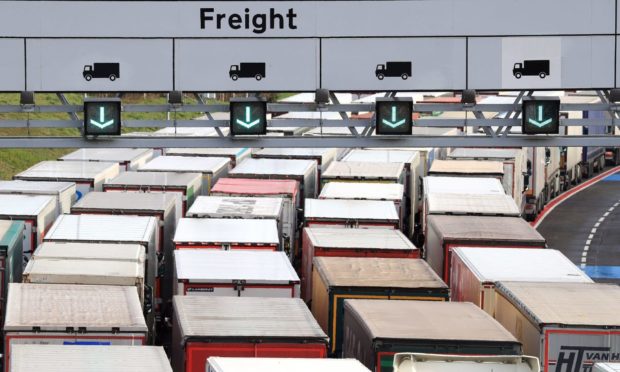Brexit disruption at the border could drag on for three months whether there is a deal or not, road haulage bosses warned as trade talks hung in the balance.
A senior figure at the Road Haulage Association (RHA) in Scotland told us there is “no way on earth things will run smoothly on January 1”, regardless of the outcome of negotiations between David Frost and Michel Barnier.
When Britain leaves the single market and customs union on December 31, goods leaving and entering the UK will need to comply with a new set of rules and regulations covering customs declarations, rules of origin checks, product safety certificates, food inspections and more.
“People have assumed if we get a deal there won’t be queues and issues will all magically disappear – they won’t,” RHA director Martin Reid said.
“Regardless of whether there is a deal or not, there will still be customs requirements and it’s the customs requirements that will cause the delays. Those delays could run on for at least the first quarter.”
Mr Reid told us the problem could be particularly acute for Scottish firms transporting live or perishable goods.

“Take shellfish as an example, if it doesn’t get to Boulogne-sur-Mer the next morning for 7.30am, it misses its on journey, that means that they lose the prime market because nobody wants to buy product that’s older than that.
“So instead of selling to the restaurants in Europe and the prime market, they’re selling to wholesalers at vastly reduced prices, that’s if the load is not spoiled entirely.”
Fiona Wright, head of regulatory affairs at Seafish, which supports the UK seafood industry, told us that disruption for the sector is “inevitable”.
She said: “Businesses are starting to do dry runs, but we won’t know until day one what will happen.
“We’ve done as much as we can, we think we’ve got it right but I think there will be inevitable problems. If, for example, paperwork isn’t ready, that will cause delays.”
‘We still have a great deal of concern’
Ms Wright said the sector and UK Government are in a much better place than last year in terms of readiness, but added: “We are still finding lots of bugs, as you would in something that’s this complicated.
“The more people start to use (the new system), the more these little problems are coming out and the more we’re able to deal with them.”
Ms Wright told us that in the last four weeks calls to Seafish about Brexit had increased “fivefold”.
Mr Reid said the fact issues remained is “shocking”. He said: “The hauliers’ handbook that they produced contains links that take you nowhere, so we’re nowhere near the level of information that is required basically.
“For goods moving to Ireland, we are still not 100% sure what it’s going to look like; as for moving through the short straits, we still have a great deal of concern as to the government’s capability either to have the right people in place.
“There’s just so many unanswered questions.”
‘A race against time’
Among those concerned about these post-Brexit delays is the Scotch whisky industry, which exports around £1.48 billion of alcohol annually to the EU.
 The Scotch Whisky Association has told us the UK Government must ensure customs arrangements are reliable come January 1.
The Scotch Whisky Association has told us the UK Government must ensure customs arrangements are reliable come January 1.
A spokesperson for the SWA said: “Its a race against time for businesses to receive all the technical guidance they need.
“The UK Government is putting in place new IT systems to manage data and declarations, and these must be reliable to ensure imports and exports flow smoothly.
“Industry concerns about adjusting to a new trading relationship with the EU at the end of the transition period have been compounded by the ongoing impact of Covid-19 lockdowns and disruption to the hospitality trade in the UK and our global markets.”
Less than one month to go…
The UK Government has said “huge advances” have been made in its preparations.
A spokeswoman said: “We are making significant preparations for the guaranteed changes at the end of the transition period including investing £705m in jobs, technology and infrastructure at the border and providing £84m in grants to boost the customs intermediaries sector.
“This is alongside implementing border controls in stages so traders have more time to prepare.
“With less than one month to go, it’s vital that businesses and citizens make their final preparations too. That’s why we’re intensifying our engagement with businesses through the Brexit Business Taskforce and running a major public information campaign so they know what they need to do to get ready.”
On the issue of fish exports, the UK Government has established a “fish export service” to provide round-the-clock technical support.
